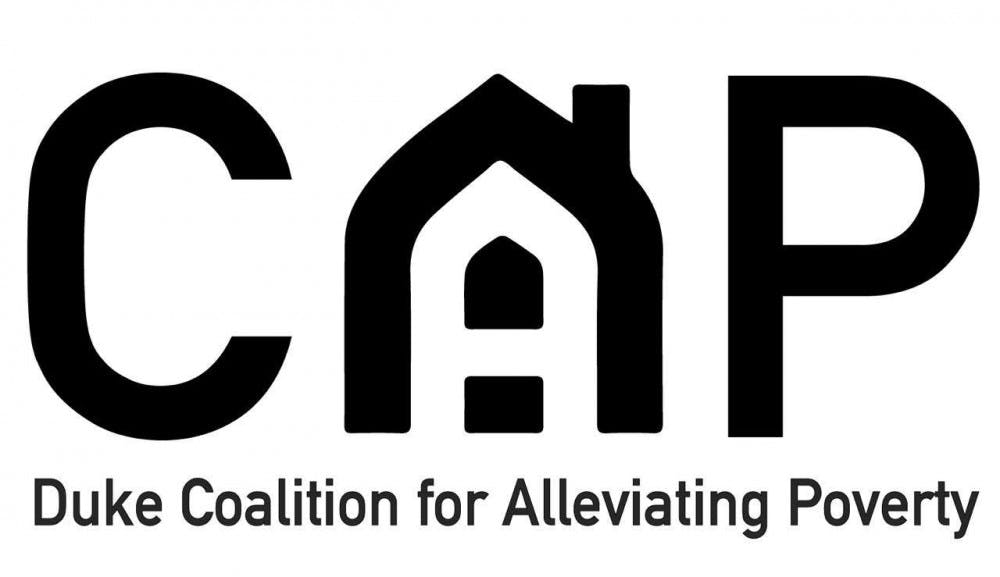Amid worries about classes and grades, many Duke students take for granted the luxury of having food and a roof over their heads. This week, a new initiative is working to change that.
The Duke Coalition for Alleviating Poverty and Duke Partnership for Service are holding Duke’s first National Hunger and Homelessness Awareness Week to foster conversation about how to address the problems of hunger and homelessness in our communities. More than 20 events this week will focus on education, service, fundraising and advocacy.
“We think this is something that is really missing from campus,” said senior Liz Brown, co-founder of the Coalition for Alleviating Poverty. “There’s a lot of focus on individual identity and international poverty, but Duke is really good at obscuring the realities of economic injustice.”
Each year, the National Coalition for the Homeless and the National Student Campaign Against Hunger and Homelessness sponsor Hunger and Homelessness Awareness Week across the country during the week prior to Thanksgiving. While interning at the National Coalition for the Homeless this summer, Brown learned that many college campuses hosted the week and decided to bring it to Duke.
Notable events included a talk Monday by Lloyd Schmeidler, the former head of Urban Ministries in Durham, who spoke about his plans to end homelessness in Durham and took the audience through a budgeting simulation of how hard it is to make ends meet on a minimum wage salary.
In addition, there will be a screening of “Whose Streets?,” a film that documents the rise of Black Lives Matter activism and shows how police brutality and poverty intersect, and a panel by Progress. Period. focusing on the financial burden of menstruation in low-income areas.
On Thursday, a panel of five Durham organizations—including Urban Ministries of Durham Homeless Shelter, Families Moving Forward—will talk about their efforts to reduce poverty. Sue Wasiolek, associate vice president for student affairs and dean of students, will finish off the week with by hosting a dinner discussion about low-income students on Duke’s campus.
“A lot of the time we forget about that because Duke is shiny and expensive,” Brown said. “We forget that there is poverty on campus, and students struggle with that every day.”
Sophomore Gino Nuzzolillo, a vice president for DPS, noted that more than 20 organizations including student groups and administrative institutions are involved in the week, which he said “grew organically.” It was important for him to make sure that many diverse campus organizations were involved, instead of having just a few students direct all the activities.
The organizers also reached out to groups that didn’t have a mission directly related to poverty alleviation but wanted to raise awareness in some way, explained senior Gabi Stewart, who serves on the executive board for the Coalition for Alleviating Poverty. For instance, Campus Enterprises hosted a spin class Sunday with all proceeds going to the Inter-Faith Food Shuttle.
She said she thinks the talk with Dean Sue will be informative for students because we often don’t think about the poverty that exists on campus—plus, Dean Sue is great.
Nuzzolillo noted that he is especially excited for the Thursday panel because it will introduce the Duke community to organizations doing work for homeless individuals in Durham.
“We’re hoping students will care enough to attend these events and get something out of them,” he said.
He explained that the organizers recognize the potentially problematic nature of having conversations about poverty within the confines of an elite institution.
However, the idea behind the week is to educate everyone on campus that issues of hunger and homelessness exist and that we are implicated in the creation of them, Nuzzolillo said. Then, we can work with local organizations to solve these problems.
“If students start to think a little more critically about the existence of those things in our society, then the week will be successful,” Nuzzolillo said.
He added that he thinks the organizers have done a good job so far of avoiding any narratives of saviorism on the part of students. He hopes the week’s events provide students with a human face to issues of poverty.
Stewart agreed that students are often sheltered from the realities of people struggling in communities nearby because of the Duke bubble.
“A good portion of Duke students haven’t experienced these issues firsthand, so it’s difficult to have empathy for them without some kind of awareness,” she said.
Nuzzolillo added that he hopes attendees gain a greater realization of their role in helping alleviate hunger and homelessness.
“We need to recognize that no matter where our niche is we are citizens of the world,” he said. “These are problems we need to find a sense of responsibility in.”
Get The Chronicle straight to your inbox
Signup for our weekly newsletter. Cancel at any time.

